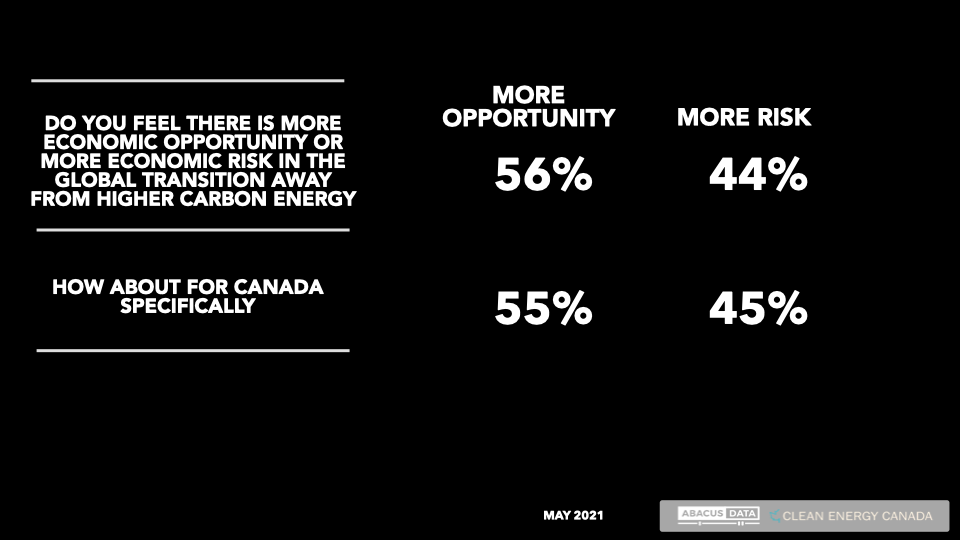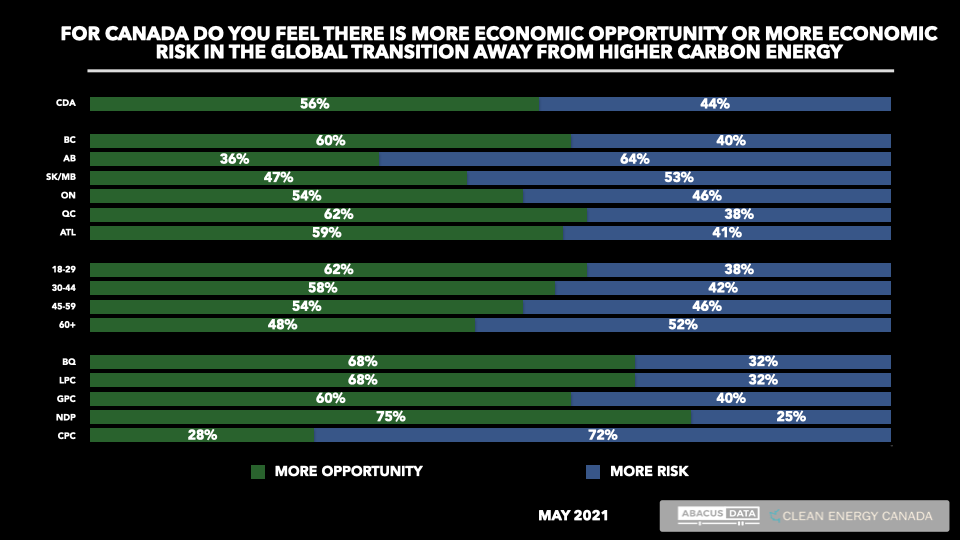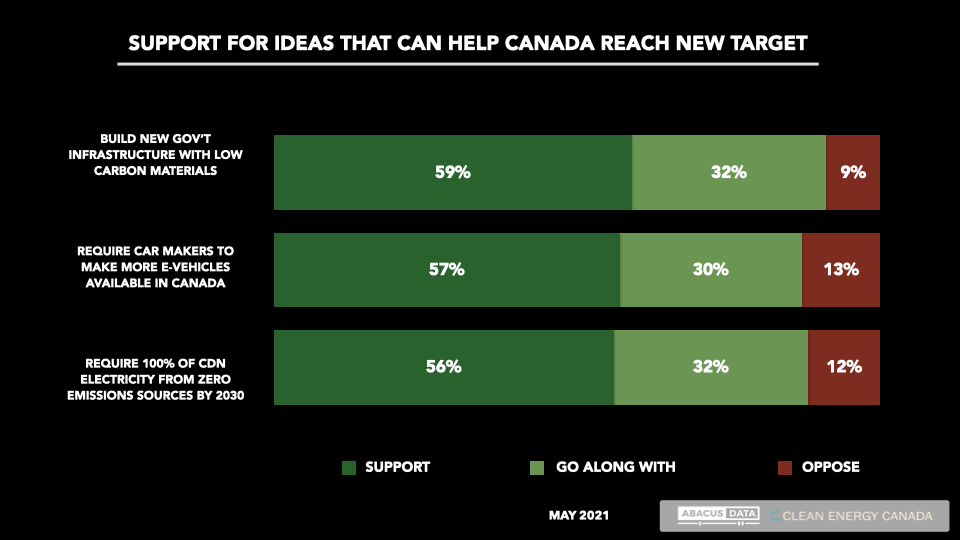Canadians see risk but more opportunity in transition; Broad support for policies designed to help an energy shift along
June 22, 2021
In the latest round of survey work by Clean Energy Canada and Abacus Data, we found 3 out of 4 Canadians believe countries that set higher emissions reduction ambitions will be more successful competitors in the global economy compared to those who set lower ambitions.
While some Canadians see economic risk in the transition away from oil and gas, a majority believe there is more opportunity than risk.
For the world in general, 56% say a shift away from higher carbon energy has more opportunity than risk (44%), and the numbers are virtually identical when the question is asked about the dynamic for Canada in particular. (55%-45%).

Young people are especially convinced of the upside of change. Almost two thirds (62%) of those under 30 see more opportunity, while those who are 60+ are roughly evenly split (48% see more opportunity)
Two-thirds of Liberal and BQ voters and three-quarters of NDP voters see more opportunity than risk. Conversely, almost three-quarters (72%) of Conservative voters see more risk.

When it comes to some specific policies that could help Canada reduce emissions and reach the new targets that the federal government has set, the large majority of people support or are willing to go along with a series of three different ideas that were tested.
The ideas included:
• Setting a new standard requiring auto manufacturers to make more electric vehicles available in the Canadian market.
• Requiring that any new government infrastructure be built using low carbon materials
• Requiring that all electricity in Canada be generated from emission-free sources by the year 2030, compared to the 83% level currently.
No more than 13% oppose any of these measures.

UPSHOT
According to Bruce Anderson: “Canadians are probably best described as ambitous pragmatists – on most issues and in particular when it comes to the changes required to combat climate change. People are aware that change could pose economic dislocation but they believe that lagging this shift would be a worse choice for Canada.
In the latest round of survey work by Clean Energy Canada and Abacus Data, we found 3 out of 4 Canadians believe countries that set higher emissions reduction ambitions will be more successful competitors in the global economy compared to those who set lower ambitions.
While some Canadians see economic risk in the transition away from oil and gas, a majority believe there is more opportunity than risk.
For the world in general, 56% say a shift away from higher carbon energy has more opportunity than risk (44%), and the numbers are virtually identical when the question is asked about the dynamic for Canada in particular. (55%-45%).

Young people are especially convinced of the upside of change. Almost two thirds (62%) of those under 30 see more opportunity, while those who are 60+ are roughly evenly split (48% see more opportunity)
Two-thirds of Liberal and BQ voters and three-quarters of NDP voters see more opportunity than risk. Conversely, almost three-quarters (72%) of Conservative voters see more risk.

When it comes to some specific policies that could help Canada reduce emissions and reach the new targets that the federal government has set, the large majority of people support or are willing to go along with a series of three different ideas that were tested.
The ideas included:
• Setting a new standard requiring auto manufacturers to make more electric vehicles available in the Canadian market.
• Requiring that any new government infrastructure be built using low carbon materials
• Requiring that all electricity in Canada be generated from emission-free sources by the year 2030, compared to the 83% level currently.
No more than 13% oppose any of these measures.

UPSHOT
According to Bruce Anderson: “Canadians are probably best described as ambitous pragmatists – on most issues and in particular when it comes to the changes required to combat climate change. People are aware that change could pose economic dislocation but they believe that lagging this shift would be a worse choice for Canada.
When the theory of change is translated into some specific policy choices that could help catalyze a shift in energy use, the vast majority are inclined to want to be open and supportive of changes in line with a spirit that there is a need to change and more opportunity than risk.”
According to Merran Smith, Clean Energy Canada’s executive director: “People understand the world is changing and that Canada needs to change with it. And encouragingly, this survey shows that when you ask them about specific policy solutions to move us forward, they still remain broadly supportive. The measures we tested are the ones Clean Energy Canada believes the federal government should prioritize to help hit Canada’s new climate target. Not only will these actions make a real dent in our emissions, but it’s clear they’re also well supported by Canadians.”
ABOUT ABACUS DATA
We are the only research and strategy firm that helps organizations respond to the disruptive risks and opportunities in a world where demographics and technology are changing more quickly than ever.
Find out more about what we are doing to help clients respond to the COVID-19 pandemic.
We are an innovative, fast-growing public opinion and marketing research consultancy. We use the latest technology, sound science, and deep experience to generate top-flight research-based advice to our clients. We offer global research capacity with a strong focus on customer service, attention to detail and exceptional value.
We were one of the most accurate pollsters conducting research during the 2019 Canadian Election.

Contact us with any questions.
Find out more about how we can help your organization by downloading our corporate profile and service offering.
METHODOLOGY
The survey was conducted with 1,500 Canadian adults from May 7 to May 12, 2021. A random sample of panelists were invited to complete the survey from a set of partner panels based on the Lucid exchange platform. These partners are typically double opt-in survey panels, blended to manage out potential skews in the data from a single source.
The margin of error for a comparable probability-based random sample of the same size is +/- 2.6%, 19 times out of 20.
The data were weighted according to census data to ensure that the sample matched Canada’s population according to age, gender, educational attainment, and region. Totals may not add up to 100 due to rounding.
When the theory of change is translated into some specific policy choices that could help catalyze a shift in energy use, the vast majority are inclined to want to be open and supportive of changes in line with a spirit that there is a need to change and more opportunity than risk.”
According to Merran Smith, Clean Energy Canada’s executive director: “People understand the world is changing and that Canada needs to change with it. And encouragingly, this survey shows that when you ask them about specific policy solutions to move us forward, they still remain broadly supportive. The measures we tested are the ones Clean Energy Canada believes the federal government should prioritize to help hit Canada’s new climate target. Not only will these actions make a real dent in our emissions, but it’s clear they’re also well supported by Canadians.”
ABOUT ABACUS DATA
We are the only research and strategy firm that helps organizations respond to the disruptive risks and opportunities in a world where demographics and technology are changing more quickly than ever.
Find out more about what we are doing to help clients respond to the COVID-19 pandemic.
We are an innovative, fast-growing public opinion and marketing research consultancy. We use the latest technology, sound science, and deep experience to generate top-flight research-based advice to our clients. We offer global research capacity with a strong focus on customer service, attention to detail and exceptional value.
We were one of the most accurate pollsters conducting research during the 2019 Canadian Election.

Contact us with any questions.
Find out more about how we can help your organization by downloading our corporate profile and service offering.
METHODOLOGY
The survey was conducted with 1,500 Canadian adults from May 7 to May 12, 2021. A random sample of panelists were invited to complete the survey from a set of partner panels based on the Lucid exchange platform. These partners are typically double opt-in survey panels, blended to manage out potential skews in the data from a single source.
The margin of error for a comparable probability-based random sample of the same size is +/- 2.6%, 19 times out of 20.
The data were weighted according to census data to ensure that the sample matched Canada’s population according to age, gender, educational attainment, and region. Totals may not add up to 100 due to rounding.



